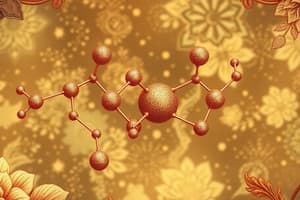Podcast
Questions and Answers
What is a common property of inorganic compounds regarding solubility in water?
What is a common property of inorganic compounds regarding solubility in water?
- Neutral
- Insoluble (correct)
- Partially soluble
- Highly soluble
Which type of bonding is usually found in organic compounds?
Which type of bonding is usually found in organic compounds?
- Ionic
- Metallic
- Hydrogen
- Covalent (correct)
Which category of compounds is known for being flammable?
Which category of compounds is known for being flammable?
- Polymeric compounds
- Organic compounds (correct)
- Inorganic compounds
- Metallic compounds
What is the main purpose of using plastics from synthetic organic compounds?
What is the main purpose of using plastics from synthetic organic compounds?
What is the condensed formula for Poly (ethene)?
What is the condensed formula for Poly (ethene)?
Which type of formula provides a more detailed structure of a compound compared to empirical formula?
Which type of formula provides a more detailed structure of a compound compared to empirical formula?
What is the main reason for the presence of a vast number of organic compounds in nature?
What is the main reason for the presence of a vast number of organic compounds in nature?
Which pair of elements can also form strong bonds similar to carbon?
Which pair of elements can also form strong bonds similar to carbon?
Which type of compound has molecules containing carbon as a major component?
Which type of compound has molecules containing carbon as a major component?
What is the term used for a more simplified version of a molecular formula showing the ratio of elements present in a compound?
What is the term used for a more simplified version of a molecular formula showing the ratio of elements present in a compound?
Which type of formula provides a detailed arrangement of atoms within a molecule, including bond types and connectivity?
Which type of formula provides a detailed arrangement of atoms within a molecule, including bond types and connectivity?
What kind of compounds are Methane, Ethane, and Ethene examples of?
What kind of compounds are Methane, Ethane, and Ethene examples of?
What does the molecular formula of a compound represent?
What does the molecular formula of a compound represent?
In organic chemistry, what does the empirical formula indicate?
In organic chemistry, what does the empirical formula indicate?
Which type of formula shows all the atoms in the bonds as lines?
Which type of formula shows all the atoms in the bonds as lines?
Which type of formula provides a shorthand way of writing the molecular formula?
Which type of formula provides a shorthand way of writing the molecular formula?
What is the main difference between molecular and empirical formulas?
What is the main difference between molecular and empirical formulas?
What is represented by the structural formula of an organic compound?
What is represented by the structural formula of an organic compound?
Flashcards are hidden until you start studying
Study Notes
Formula of Organic Compounds
- Molecules of organic compounds can be represented by different types of formulas: Molecular formula, Empirical formula, Structural formula, Condensed formula, and Bond-line formula.
- Molecular formula: Actual number of atoms of each element in a molecule (e.g. Glucose: C6H12O6).
- Empirical formula: Simplest ratio of atoms of each element in a molecule (e.g. Glucose: CH2O).
- Structural formula: Shows all atoms in the molecule and bonds between them (e.g. Propane).
- Condensed formula: Shorthand way of writing molecular formula (e.g. CH3CH2CH3).
- Bond-line formula: Represents structure between carbon-carbon bonds (e.g. CH3CH2CH2CH3).
Classifications of Organic Compounds
- Organic compounds can be classified into two categories: Naturally Occurring Organic Compounds (e.g. Proteins, Fats and Oils, Vitamins) and Synthetic Organic Compounds (e.g. Plastics, Medicines and Drugs, Pesticides).
Properties of Organic Compounds
- Properties of organic compounds differ from inorganic compounds: Bonding with molecules (covalent), Forces between molecules (weak), Normal physical state (gases, liquids or low-melting-point solids), Flammability (often flammable), Solubility in water (insoluble), and Conductivity (non-conductor).
Why is Organic Chemistry Special?
- Catenation is the reason for the presence of the vast number of organic compounds in nature.
- Carbon-carbon bonds are strong, allowing long chains or rings of carbon atoms to form.
- Carbon is unique in forming bonds to itself and with many other elements, including hydrogen and strongly electron-attracting elements.
What is an Organic Compound?
- An organic compound is any member of a large class of gaseous, liquid, or solid chemical compounds whose molecules contain carbon.
- Carbon is a major component of all organic compounds, including carbohydrates, lipids, proteins, and nucleic acids.
Studying That Suits You
Use AI to generate personalized quizzes and flashcards to suit your learning preferences.




